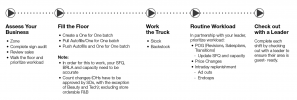I have to ask the hard question knowing that I'm severely lacking in this area.
I don't know how to properly performance out a team member.
I don't think any leads at my store are trained well either. We have a lot of team members that are pulling us down. And keeping them on because we don't know how to properly remove them is hurting us.
Can someone, explain the process so that it's professional and consistent?
I want to share this with my leadership team so we can better address the weak players and maybe get them up to snuff or get them outta way.
I don't know how to properly performance out a team member.
I don't think any leads at my store are trained well either. We have a lot of team members that are pulling us down. And keeping them on because we don't know how to properly remove them is hurting us.
Can someone, explain the process so that it's professional and consistent?
I want to share this with my leadership team so we can better address the weak players and maybe get them up to snuff or get them outta way.

